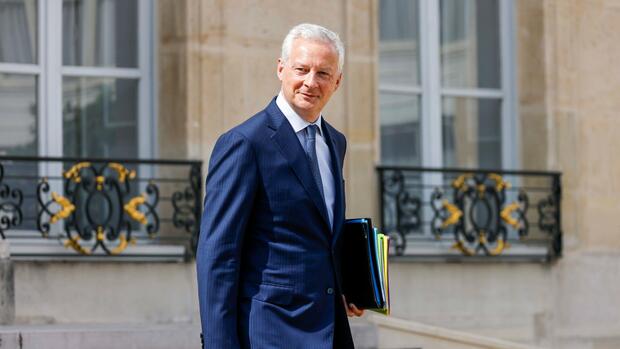France’s finance and economics minister is calling for a balance between budget consolidation and investment in growth.
(Photo: IMAGO/MAXPPP)
Paris France’s Finance and Economics Minister Bruno Le Maire has called on the federal government to develop a common growth strategy for Europe. “Companies expect clear messages from both our governments,” Le Maire told Handelsblatt. “We must not forget that we have an interest in succeeding together: If Germany is doing well, France is also doing well – and vice versa.”
Europeans would have to ask themselves how they could invest better and more efficiently. “The real economic policy question is how Europe, as a continent with an aging population and a shortage of skilled workers, ensures its productivity, competitiveness and growth,” said the minister. “That is the question to which we must find an answer together with Germany.”
Le Maire warned against focusing one-sidedly on reducing national debt. “Fiscal rules and debt reduction are very important to me,” he said. “But the prerequisite is that we retain the ability to invest.”
Read the entire interview here:
Mr Minister, France’s economy appears to be emerging from the crises of recent years stronger than many EU countries. How do you explain that?
I believe a key explanation is the stability and visibility of our economic policy. It’s the first time in France for a long time that we’re on a consistent course. This is a sign of trust for the companies. We pursue a supply-side policy. A policy that values work and aims to reindustrialize France.
What measures helped France?
Since 2017, we have initiated bold and effective reforms with President Emmanuel Macron. We have reduced corporate taxes from 33.3 to 25 percent. We have reduced the tax burden on households. We introduced a flat tax on capital gains, which has strengthened the Paris financial center.
We have made structural reforms in unemployment insurance and pensions, and we have launched a massive training and qualification plan. Since 2017, 100,000 new industrial jobs have been created, a total of two million jobs have been created.
Recently, the growth prospects for France have also deteriorated…
There are signs of slowing growth across Europe, and France is a European country. But I think France is coming out of the affair well. Our numbers are good – but it is now important to define a European strategy to get out of this phase of inflation and, in particular, to prevent us from being left with weak growth afterwards. This is Europe’s great challenge at a time when the USA and China are investing massively in their economies.
What do you suggest?
Europe needs to ask itself how it can invest better and more efficiently to regain productivity and growth. I fully understand that we want to have balanced budgets. I fully understand that we need to reduce debt. And I feel absolutely obliged to reduce the French debt and reduce it more quickly.
But the real economic policy question is how Europe, as a continent with an aging population and a shortage of skilled workers, ensures its productivity, competitiveness and growth. That is the question to which we must find an answer together with Germany.
Berlin is too focused on solid state finances?
We have to find the right balance: neither austerity nor excessive spending. Budget rules and debt reduction are very important to me. But the prerequisite is that we maintain the ability to invest. Because the best way to reduce national debt is not only to reduce public spending, but also to have more growth.
Last week you took part in the German-French business meeting in Evian. What was your impression?
That economic and geopolitical developments, such as the decline in growth in China or the war in Ukraine, raise many questions. Germany and German companies are experiencing these changes in a very direct way. There are also concerns about the sharp rise in interest rates and the impact on economic activity.
I have great expectations that our countries will continue to work together. Businesses expect clear messages from both our governments. We must not forget that we have an interest in succeeding together: If Germany is doing well, France is also doing well – and vice versa.
More: How France keeps electricity prices low for industry
